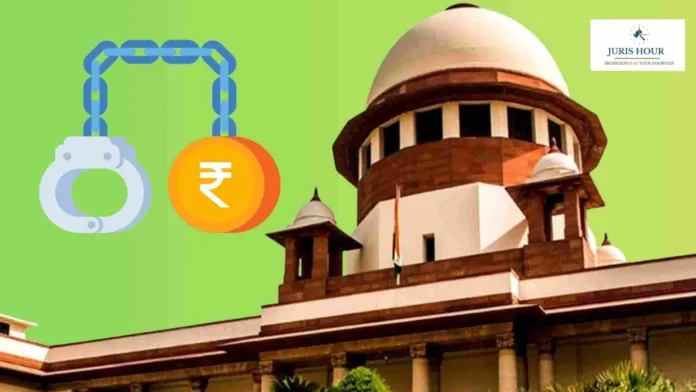The Supreme Court dismissed a criminal appeal filed by Gajanan Dattatray Gore, who had failed to comply with a bail condition tied to a monetary undertaking.
The bench of Justices J.B. Pardiwala and R. Mahadevan not only upheld the cancellation of his bail but also issued binding directions to all High Courts and Trial Courts across the country, barring them from granting bail based on financial undertakings.
Background of the Case
Gajanan Dattatray Gore, a former business development manager at I-Can Training Institute and Satara Advertising Company in Maharashtra, was arrested on August 17, 2023, for allegedly siphoning off ₹1.6 crore from the company. A criminal case was registered against him at Satara City Police Station under various provisions of the Indian Penal Code (IPC), including Sections 406 (criminal breach of trust), 420 (cheating), 467, 468, and 471 (forgery and use of forged documents).
Gore approached the Bombay High Court for bail, which was granted on April 1, 2024, with a specific condition: he was to deposit ₹25 lakh in the trial court within five months, as per his own voluntary affidavit-cum-undertaking dated March 22, 2024. He was released after furnishing a personal bond and sureties, and the High Court accepted his affidavit in good faith.
Breach of Undertaking and Bail Cancellation
Despite securing release, Gore failed to deposit the promised amount. Respondent No. 2—the original complainant—filed an application for cancellation of bail. The Bombay High Court found merit in the claim and, on July 1, 2025, cancelled the bail, ordering Gore to surrender before the Judicial Magistrate, Satara, within four weeks.
The court noted that Gore had used the promise of payment as a ploy to secure bail and had later reneged on the undertaking without remorse or valid justification.
Supreme Court’s Stern Observations
The court took serious exception to the growing trend of bail orders being passed on the basis of undertakings for financial deposits:
“We have come across many cases where the accused files an affidavit to deposit money, gets released, and then disowns the commitment claiming it was onerous or unauthorized,” the Court observed.
Noting this “abuse of process” as an affront to the dignity of the judiciary, the Court categorically barred such practices:
“Henceforth, no Trial Court or High Court shall pass any order granting bail—regular or anticipatory—on the basis of any undertaking for monetary deposit. Bail must be decided strictly on merits.”
The Court also commented on the ethics of legal professionals, noting that it was improper for lawyers to argue that a client’s own voluntary financial undertaking was unreasonable after obtaining relief.
Cost Imposed and Fresh Bail Option
For what it termed “gross abuse of process,” the Supreme Court also imposed a cost of Rs. 50,000 on Gajanan Gore, to be deposited within a week at the Supreme Court Mediation Centre. However, the Court clarified that Gore is free to file a fresh bail application after surrendering, which will be decided solely on legal merits and without reference to any prior financial assurances.
Case Details
Case Title: Gajanan Dattatray Gore Versus The State Of Maharashtra & Anr.
Case No.: Criminal Appeal No.3219/2025
Date: 28th July, 2025
Read More: TVS Motor Secures NCLT Approval to Issue ₹1,900 Crore Worth of Bonus Preference Shares

